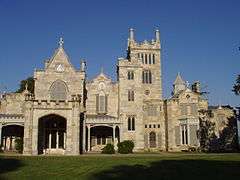Lyndhurst (mansion)
|
Jay Gould Estate (Lyndhurst) | |
|
The front facade of Lyndhurst | |
| Location | Tarrytown, New York, U.S. |
|---|---|
| Nearest city | White Plains, New York, U.S. |
| Coordinates | 41°03′21″N 73°51′55″W / 41.05583°N 73.86528°WCoordinates: 41°03′21″N 73°51′55″W / 41.05583°N 73.86528°W |
| Area | 67 acres (27 ha) |
| Built | 1838 |
| Architect | Alexander Jackson Davis |
| Architectural style | Gothic Revival |
| Website | www.lyndhurst.org |
| NRHP Reference # | 66000582 |
| Significant dates | |
| Added to NRHP | November 13, 1966[1] |
| Designated NHL | November 13, 1966[2] |
Lyndhurst, also known as the Jay Gould estate, is a Gothic Revival country house that sits in its own 67-acre (27 ha) park beside the Hudson River in Tarrytown, New York, about a half mile south of the Tappan Zee Bridge on US 9. The house was designated a National Historic Landmark in 1966.[2][3]
History
Designed in 1838 by Alexander Jackson Davis, the house was owned in succession by New York City mayor William Paulding, Jr., merchant George Merritt, and railroad tycoon Jay Gould. In 1961, Gould's daughter Anna Gould donated it to the National Trust for Historic Preservation. It is now open to the public.
The house was first named "Knoll", although critics quickly dubbed it "Paulding's Folly" because of its unusual design that includes fanciful turrets and asymmetrical outline. Its limestone exterior was quarried at Sing Sing in present day Ossining, New York.
The second owner, Merritt, doubled the house's size in 1864-1865 and renamed it "Lyndenhurst" for the estate's linden trees. His new north wing added an imposing four-story tower, new porte-cochere (the old one was reworked as a glass-walled vestibule) and a new dining room, two bedrooms, and servants' quarters.
Gould purchased the property in 1880 for use as a country house, shortened its name to "Lyndhurst" and occupied it until his death in 1892.
Architecture

Unlike later mansions along the Hudson River, Lyndhurst's rooms are few and of a more modest scale, and strongly Gothic in character. Hallways are narrow, windows small and sharply arched, and ceilings are fantastically peaked, vaulted, and ornamented. The effect is at once gloomy, somber, and highly romantic; the large, double-height art gallery provides a contrast of light and space.
The house sits within a park, designed in the English naturalistic style by Ferdinand Mangold, whom Merritt hired. He drained the surrounding swamps, created lawns, planted specimen trees, and built the conservatory. The resultant landscape was the first such park along the Hudson River. It provides an outstanding example of 19th-century landscape design, with rolling lawns accented with shrubs and specimen trees, a curving entrance drive that reveals "surprise" views, and a remarkably large (390-foot-long (120 m)) steel-framed conservatory (the first in the United States).
In popular culture
- Lyndhurst was the set for the 1970 movie House of Dark Shadows and the 1971 movie Night of Dark Shadows, both based on the gothic soap opera Dark Shadows.
- ABC's holiday telefilm The Halloween That Almost Wasn't, a.k.a. The Night Dracula Saved the World, was shot here. The scenes were used as the backdrop for both Count Dracula and the Witch's castle. It later aired on the Disney Channel during its Halloween season until the late 1990s.
- Director Sidney Lumet used Lyndhurst as a film location twice for Reversal of Fortune (1990) and Gloria (1999).[4]
- The History Channel's The Men Who Built America filmed at Lyndhurst in the summer of 2012.[5]
- Winter's Tale was filmed at Lyndhurst in January 2013.[6]
- Lyndhurst was featured on Season 1, Episode 3 of Travel Channel's Castle Secrets & Legends series with an original airdate of February 9, 2014.[7]
- Lyndhurst was also used as a filming location for ABC's Forever in 2014, using the cottage on the property for exterior shots.
Gallery
 Gould's office
Gould's office The north library
The north library A dining room fireplace
A dining room fireplace- A view from the front park
- The estate in bloom
See also
- List of National Historic Landmarks in New York
- National Register of Historic Places listings in northern Westchester County, New York
References
- ↑ National Park Service (2009-03-13). "National Register Information System". National Register of Historic Places. National Park Service.
- 1 2 "Lyndhurst". National Historic Landmark summary listing. National Park Service. Retrieved September 15, 2007.
- ↑ Richard Greenwood (May 30, 1975), National Register of Historic Places Inventory-Nomination: Jay Gould Estate, Lyndhurst (PDF), National Park Service and Accompanying photos, exterior, 1975 and undated. (3.32 MB)
- ↑ "Lyndhurst Earning Keep as a Film Site". The New York Times. November 30, 1997. Retrieved February 11, 2014.
- ↑ "Lyndhurst Closed Friday For Documentary Filming". Tarrytown-Sleepy Hollow Patch. July 2, 2012. Retrieved February 11, 2014.
- ↑ "Hollywood Snow Falls on Lyndhurst". Rye Patch. January 29, 2013. Retrieved February 11, 2014.
- ↑ "Hound of the Baskervilles, Lord Gordon Gordon, Escape from Colditz". Travel Channel. February 9, 2014. Retrieved February 11, 2014.
Further reading
- Great Houses of the Hudson River, Michael Middleton Dwyer, editor, with preface by Mark Rockefeller, Boston, MA: Little, Brown and Company, published in association with Historic Hudson Valley, 2001. ISBN 0-8212-2767-X.
External links
| Wikimedia Commons has media related to Lyndhurst (Tarrytown, New York). |
- Official website
- Historic American Buildings Survey (HABS) No. NY-5538-A, "Lyndhurst, Main House, 635 South Broadway, Tarrytown, Westchester County, NY", 98 photos, 16 measured drawings, 5 data pages, 6 photo caption pages
- HABS No. NY-5538-B, "Lyndhurst, Greenhouse", 38 photos, 5 data pages, 4 photo caption pages
- HABS No. NY-5538-C, "Lyndhurst, Outbuildings", 8 photos, 2 color transparencies, 3 photo caption pages
- HABS No. NY-5538-D, "Lyndhurst, Stables", 5 photos, 1 photo caption page
- HABS No. NY-5538-E, "Lyndhurst, Swimming Pool", 4 photos, 1 photo caption page
- HABS No. NY-5538-F, "Lyndhurst, Boat Landing", 3 photos, 1 photo caption page


